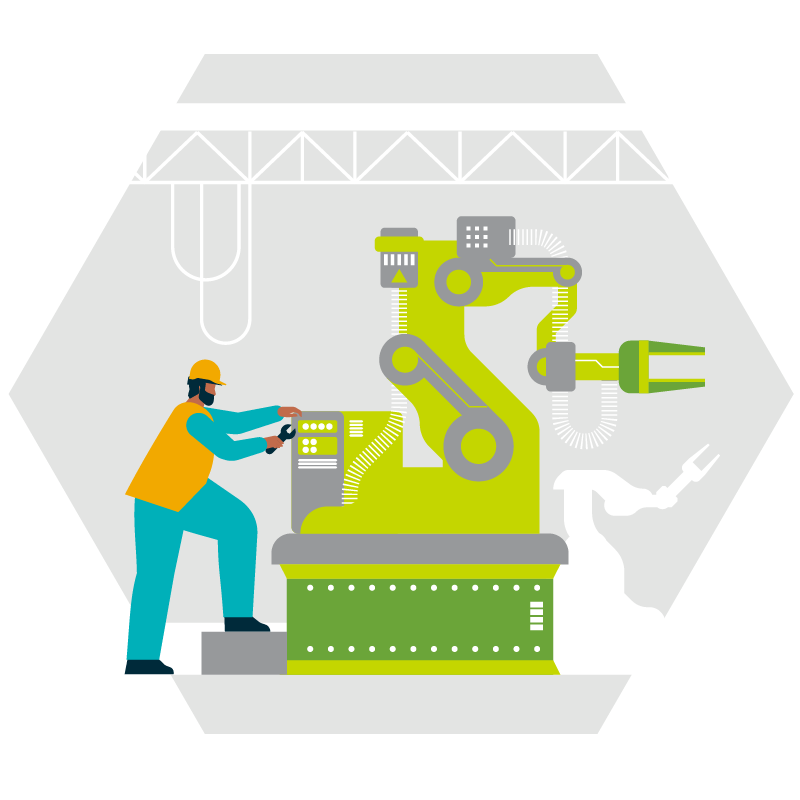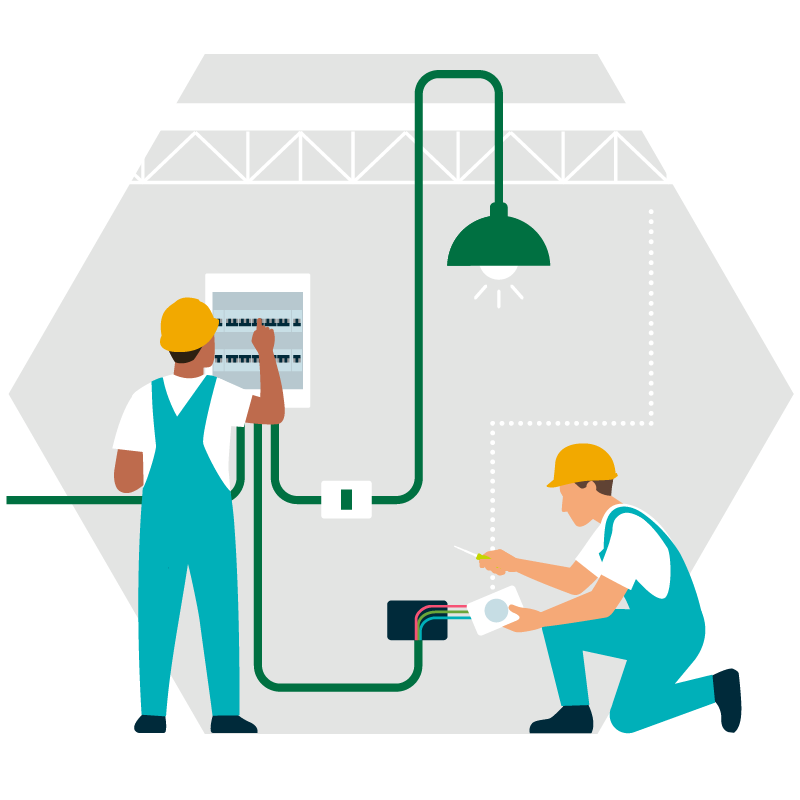Apprenticeships
Apprenticeships subtitle





Where are we now?
The apprenticeship dashboard displays apprenticeship starts over the past four years. Data is structured and filterable by the seven broad categories which align to the sectors which are deemed to have the highest intensity of green jobs: Automotive, Construction and Building Services, Electrical Installation, Energy and Utilities, Engineering (including Electrical Engineering), Environmental Services and Manufacturing.
The report picks up enrolments to a list of green apprenticeship standards identified as relevant from the knowledge and skills specification documents and cross referenced to the IfATE dark green and mid green classification published in the IfATE occupational maps.
The green apprenticeship standards with significant numbers of starts are predominately ‘secondary green’ and appear to be less ‘focused green’ than courses delivered to adults through the Adult Skills Fund. The apprenticeship knowledge, skills and behaviours appropriate for initial training in an occupation typically cover a broad range of themes with green specific skills often being only a small part (e.g. Motor Vehicle Technicians would be gaining skills across all types of vehicles not just electric/hybrid cars).
- Automotive apprentices are falling slightly in line with national trends.
- Construction and Building Services and Electrical Installation apprenticeship starts in the region are low and compare poorly with other areas of England.
- The West Midlands region is at the bottom of the national table for Electrical Installation apprenticeships, compared with being at the top for Electrical Installation courses for adults.
- There is a relatively high number of Engineering and Electrical Engineering apprentices in the West Midlands (1,500+)
- Apprenticeship starts in Energy and Utilities, Environmental Services and green Manufacturing are very low regionally.
Key data
Automotive
The West Midlands has reasonable levels of participation in pipeline apprenticeships in Automotive, behind only the southwest region.
Start numbers declined by 2.4% in 2023/24. Despite this dip, the proportion who were supported at a college rose by 16% to 39%, meaning a net increase in college starts from 209 to 243. Participation is reasonably distributed across the region.
Shifts seen in 2023/24 include:
- A drop in the proportion of advanced level apprenticeships, from 80% to 70%.
- A 10% increase in the number of apprentices under 19, from 58% to 68%.
- Fewer White apprentices, from 90% to 85%.

Construction & Buildings Services
The West Midlands has relatively low levels of participation in pipeline apprenticeships in construction and building services and remains near the bottom of the national table. Last year there was a decline in the number of Construction and Building Services apprenticeship starts in most other regions of the country apart from in the Southwest, the top performing area.
Participation is reasonably distributed across the region. The number of Construction and Building Services apprenticeship starts in 2023/24 was 372, representing a levelling off in start numbers.
Other year-on-year changes are:
- The proportion of apprentices learning at college increased from 74% to 84%
- 54% of apprenticeships are at advanced level, down from 62%
- A slight improvement in the gender disparity with 1% more female apprentices, 1% more apprentices from diverse backgrounds.

Electrical Installation
Despite a 5% increase in starts in 2023/24, the West Midlands has relatively low levels of participation in pipeline apprenticeships in electrical installation, ahead of only London. This contrasts with the performance in adult skills funded electrical installation courses, where the West Midlands ranks top nationally.
Almost all starts are on the Installation and Maintenance Electrician standard which is at advanced level and participation is reasonably distributed across the region.
47% of Electrical apprentices study at college, 2% drop from 2022/23.
Between 2022/23 and 2023/24 the proportion of females fell by 1% and the representation from diverse backgrounds decreased by 7%

Energy & Utilities
The West Midlands has comparable levels of participation in pipeline apprenticeships in energy and utilities with other regions. The year-on-year numbers remain stable at 64, down from 81 in 2021/22. This represents two in every 100,000 of working age population. The top performing area nationally is the Southwest with 3 per 100,000.
Apprentices study at levels 2, 3, and 4, in power networks, electrical power networks, smart meter installation, and utilities engineering.
A key development in 2023/24 is that 8 or the 64 starts were with a college provider marking the entry to this market with 13% of market share.

Engineering (Including Electrical Engineering)
In 2023/24 the number of apprenticeship starts in the engineering/electrical engineering sector in the West Midlands was 1,512, a fall of 7.7% on the previous year. The proportion learning at a college also fell but by a smaller degree to just under a quarter.
Nationally the West Midlands region remained in second nationally in terms of number of engineering apprenticeship starts. The Southwest remained in the top position.
Since 2023/24 there has been an increase in diversity in participation. An increase of 6% in female apprentices an increase of 2% in representation from diverse ethnic backgrounds. Half of apprentices are aged 16-18.

Environmental Services
The West Midlands has comparable levels of participation with other regions in apprenticeships in environmental services. Despite low levels the upward trend continued last year in the West Midlands, taking starts to 105.
Predominantly, apprentices study at level 2, but there is provision and levels 3 to 4, and degree apprentices in environmental practitioners.
Almost all standards were for the water industry. Water Process Operative was the most popular standard with 33 on this standard in 2023/24. The number on the Corporate Responsibility and Sustainability Practitioner standard went from 8 in 2022/23 to 18 in 2023/24.
Colleges do not support environmental services apprenticeships.

Manufacturing
The West Midlands has comparable levels of participation with other regions in pipeline apprenticeships in manufacturing and ranks third nationally.
The number of apprentices in the manufacturing sector rose by 24% to 209 in 2023/24. The proportion learning in a college also rose by 6% to 37% (77 apprentices).
Most apprenticeships are at degree level. 60% were at level 6 in 2023/24 up from 54% the year before. Those at level 4 dropped from 45% to 39%. The numbers on the Product Design and Development Engineer standard rose from 37 to 66 over the two years.
It is likely that apprentices employed in manufacturing industries are taking other broader subjects such as Engineering apprenticeships rather than specific Manufacturing apprenticeships.
There is a concerning gender disparity, with the proportion of females declining by 8% last year. Representation of apprentices from diverse backgrounds increased by 10%.

Explore the data
Click here below to choose your sector
Case Studies

The manufacturing sector in the West Midlands is crucial to the region’s future economic success. With the push for a greener future, manufacturing and engineering companies are evolving towards more sustainable practices and the use of cleaner energy sources. To meet their future training needs, colleges must stay abreast of technological advancements in areas such as battery technology, electrification, and hydrogen power. Collaboration between WMG at the University of Warwick and West Midlands colleges has resulted in the development of a region-wide electrification strategy. The strategy includes the development and roll out of specialised training programmes to upskill over 300 college staff in areas like electro-pneumatics and lithium-ion battery recycling. Colleges are also tapping into the benefits of fellowship schemes connecting further education lecturers with higher education colleagues.
Higher education is often focused on providing solutions to capability challenges faced by industry. But the reality is that further education colleges do, and will continue to, play a much more important role in delivering re-skill and up-skill opportunities to industry. WMG views the support and development of colleges as critical.
Dr Benjamin Silverstone - Associate Professor, Workforce Transformation Strategy and Policy, at WMG
